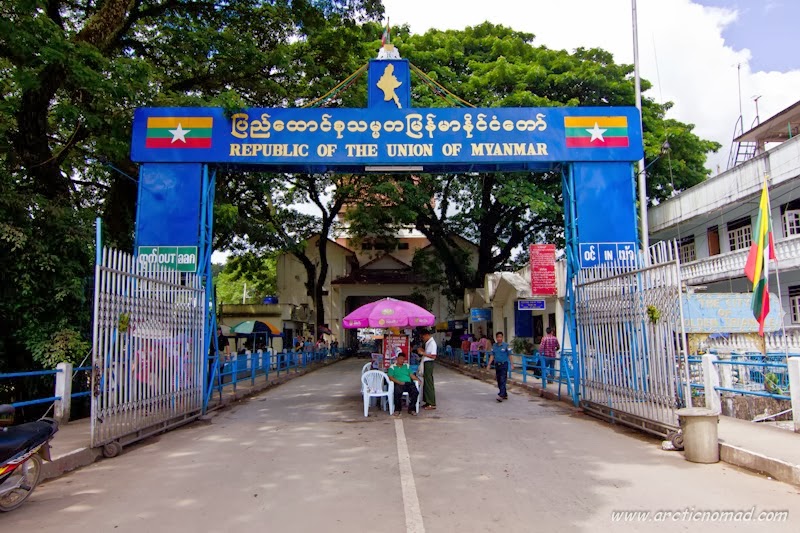Battling British workers’ rights crusader Andy Hall has gone head on with Thailand with a report which accuses Thai officials, agents, and employers, of systematically shaking down Myanmar (Burmese) workers for cash.
A report which he has presented through the Migrant Workers Rights Network accuses Thais of cheating a staggering 1.7 million Burmese workers in Thailand – posing the question – who has not been cheated?
Hall from Spalding, Lincs, who is famously being sued by the Natural Fruit Company, who produce canned pineapple out of Prachuap Kiri Khan, for his reports on Burmese labour there, is showing incredible resolution. The latest report by MWRN details what he describes as a ‘corruptionfest’
The corrupt payments are demanded by workers processed through what is known as the National Verification Scheme. They should only be charge a few baht but most if not all are being charged many times the official rate.
“These are four year passes. Now the four years are up they are starting all over again,” said Andy Hall last night.
If the allegations are true then unless the system changes then Thailand may have problems with its neighbours when the new ASEAN Community swings in.
Comment:
Here in Bangkok where thousands are gathering daily on the streets demanding an end to corruption and to ‘Restart’ Thailand, the MWRN report seems to suggest that the getting rid of corruption in Thailand is a massive problem – and that everybody is at it.
But maybe getting rid of corruption against foreigners is not on the agenda and the people just want a fairer share of the spoils.
Anyway I am not going down that road. I would like to see a Thailand restart too. Here follows the report:
==========================
1.7 Million Burmese Migrant Workers Cheated
Migrant workers, millions of whom come from neighboring Burma, are being cast adrift in a chaotic migration system – known as the National Verification Scheme – forcing them to pay as much as 10 times the official cost for their documents in Thailand, according to the Migrant Workers Rights Network (MWRN).
“More than 1.7 million Myanmar workers have been cheated by agents, brokers, employers and officials for the 1, 050 Baht official costs of the previous NV process and documents as they had to pay 5 to 10 times that amount to complete NV.” MWRN said in a media statement.
MWRN, which aims to improve labour rights of Burmese migrant workers in Burma and Thailand, said workers were worried and frightened.
“Workers are now really scared and becoming angry that they may face the same exploitative circumstance again now that their permission to remain in Thailand beyond 4 years has expired.”
Andy Hall, a MWRN spokesperson claimed that Thailand’s migration policy was a “complete shambles.” Adding, “All of these workers don’t know what they can do when their visa has expired.”
A Policy Vacuum
The NV scheme refers to a 2003 agreement reached between the Thai and Burmese governments with the purpose of regularizing and documenting workers in Thailand. From 2009, Burmese workers could apply for, and receive a temporary six-year Burmese passport and two-year Thai visa and work permit through the NV process. The two-year visa is extendable for a further two years after which migrants have to return to their country of origin for at least three years.
A September 2013 agreement by the Thai and Burmese governments on the extension of Thai visas for workers who remain in Thailand beyond four years was initially welcomed by workers groups, but is now criticized for being “worryingly vague” and “not transparently implemented,” thus leaving the migrants vulnerable to extortion, MWRN said.
“This policy chaos and lack of transparency already means more than 100, 000 Myanmar workers in Thailand are irregular as their stay permission of 4 years has expired. These workers cannot extend their visas and are subject to a daily 500 baht overstay fee whilst the risk and reality of exploitation and extortion are increasing.” The MWRN said, adding,
“Workers are being dismissed by employers and cheated by agents and employers offering fake or expensive documents. More worryingly, such workers are increasingly being arrested and extorted by law enforcement officials or forced to buy unlawful protection cards in some provinces.”
MWRN argued that workers wanting to legally stay in Thailand for more than four years were left in the dark, with the extension procedure of temporary or permanent passports still unclear:
“This policy vacuum and lack of procedural clarity means employers and workers must rely on expensive and unregulated Thai and Myanmar labour agents or brokers for information and to navigate complex procedures.”
Adding to the confusion, the Burmese government announced a policy to change temporary NV passports to permanent passports for all Burmese workers in Thailand. MWRN said that workers were anxious because family registration certificates and an ID card would be required – documents which many workers never had – especially since many workers have different names on their temporary passports and official documents.
“Workers with temporary passports already have social security and life insurance benefits, own vehicles and have bank accounts. All of these benefits are now at risk,” MWRN said.
Millions of Dollars at Stake?
Myint Oo, 30, a migrant working at a factory in Mae Sot, Tak province, said he paid 7,500 baht for a two-year temporary Burmese passport; a small fortune for workers who can earn as little as 30,000 baht a year.
Mr. Hall alleged that authorities were making millions of dollars off the backs of migrant workers like Myint Oo.
“A process that should cost about 1,000-1,500 baht is costing 5-6 times that amount. A huge amount of money is being out of this; I mean it is hundreds of millions of dollars. There is something like 2 to 3 million migrant workers in Thailand. A huge amount of money is being taken from them. And they are some of the most vulnerable people within the society.”
Mr. Hall claimed that the system was geared to take money of migrants.
“The whole process is handled in a way to get the most money from the workers. By making it as confusing as possible so migrants have to use agents and brokers to pay a lot of under the table fees. So the current system is not good enough. This whole 4 years process has come about and is becoming more and more confusing with the intention to confuse the workers and extort money from them,” he said.
Myint Oo was scared to confront local authorities, especially the police. “We are scared of the police because they can make life difficult for us,” he said, “even if we have appropriate documents they can be a problem and ask for money.”
A Daily Struggle
For many migrants in Thailand, just eking out a living means there is no time to think about broader government policy issues.
Ko Win Cho, 53, a labourer in Mae Sot, Tak province, told Karen News that everyday life is hard for migrant workers like him. He works as a labourer unloading goods from trucks in the back-alleyway of a factory in Mae Sot, Tak province. The work lasts all day, starting at eight in the morning.
“Sometimes if the loads are large or the trucks are very full we will work until eight at night,” he says, resting against a charcoal stained wall surrounding cement cubicles where he and several dozen fellow workers live.
Ko Win Cho said that he and his colleagues could perhaps earn 150 baht ($5) from a 12-hour shift, adding he earns around 3,000 baht a month. His family stayed behind in Pago Division, Burma, while he moved to Thailand to earn better money.
Ko Win Cho missed his family.
“My dream is for my two daughters in Burma to have a good education. They dream to be medics or doctors. I work in Thailand to fund their education so they can have a decent shot at life,” he said.
A fellow workmate of Ko Win Cho’s, Saw Myo Aung, 24, said he was depressed.
“My wife has divorced me,” he mentioned quietly. He said that she had taken up work in Bangkok to help support their six year-old daughter in Burma, but being away from each other had strained the relationship so they split up.
“My dream is impossible. I want to earn enough money to support my daughter, but I have lost contact with her,” he said.
Ma Chow, 40, a sugar-cane worker living on the outskirts of Mae Sot, echoed the concerns of the Mae Sot factory workers. Originally from Burma, she came to Thailand to find work in 2012 because a flood had destroyed her farm and home.
“If we get injured or sick at work [boss] he doesn’t provide medicine or take care of us,” she said, “one time a trailer fell on to my husband’s leg; he was injured and couldn’t work for four days, after that time the boss made him work again.”
Ma Chow is on a one-year stay permit for Mae Pa village area, meaning she cannot legally venture into Mae Sot or anywhere else in Thailand. Nevertheless, her boss had a farm outside the area in Gapipan, and though it was illegal she used to work on that farm until the police caught her and fined her 500 baht – a week’s wages.
After she was fined, she refused to work outside Mae Pa area, so the boss began to threaten to destroy her home if she didn’t return to the Gapipan farm. “Me and my husband built this house with our own hands – we do not want to leave it.”
As a sugar-cane worker, she earns half of what she used to as a farmer at Gapipan, “I earn 75 baht a day, because we get 1.5 baht for 10 sugar cane and I am not very fast; I have only just started getting used to this kind of work, I used to earn 150 baht a day at the other farm.”
Mr. Hall maintained that solving the “chaotic” system that left migrant workers in legal limbo and vulnerable to exploitation was relatively simple.
“There is no commitment to systematically solving migration issues. People whose visa has expired after the four years should get a new visa – the economy needs them, the employers need them and they want the work. So they should be just given a new visa. It’s as simple as that.”






